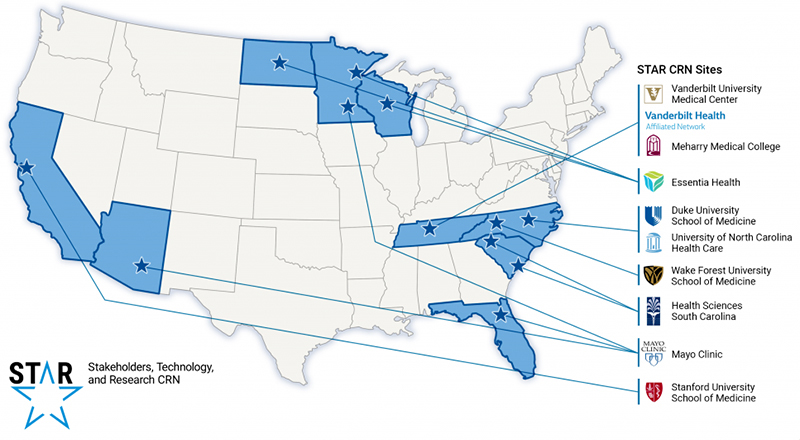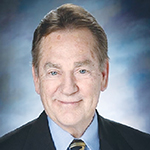
Patients at Essentia Health now have a say in what the health system's researchers study.
Earlier this year, the Minnesota-based system became part of the Stakeholders, Technology and Research (STAR) Clinical Research Network alongside Stanford University. It's one of 10 health systems in the partnership.
STAR CRN, a member of the National Patient-Centered Clinical Research Network, has data on more than 15 million patients and involves patients in the research process.
"Through this network, we have access to a broad array of clinical data, informatics tools, patients, providers, and systems to address an array of research questions," the STAR CRN website notes. "The objective of our CRN is to robustly support comparative effectiveness studies, pragmatic clinical trials, health system innovation, and the other research needs of our stakeholders and partners."

Dr. Catherine Benziger, a cardiologist at Essentia, said an important aspect of the network's research is that it is patient-driven and patient-focused.
"Rather than research just being done in ivory towers and urban areas, (STAR CRN is) linking researchers in those settings with large health systems and then also really prioritizing research that patients want to do," she said. "And it's doing research differently in that in every stage of every research application, a patient or patient partner … has to be involved in that process of designing the research. It's not just a bunch of Ph.D.s and M.D.s designing the research."
Essentia has a co-principal investigator model with Benziger and Dr. Stephen Waring, principal scientist at the Essentia Institute of Rural Health, at the helm. The institute is Essentia's research center. It offers patients participation in dozens of studies. Essentia includes 14 Catholic hospitals, which take part in the research.

Also part of the Essentia's STAR CRN team are two research evaluation specialists, a patient partner and a stakeholder engagement lead.
"That is our core team," Benziger said. "But then we are reaching out to a lot of our clinical groups, like primary care and subspecialty groups, as well as our population health and our nursing informatics."
Waring said what makes Essentia's inclusion special is that the network is the "star consortium" of clinical research networks and Essentia is the only partner that is not an academic medical center.
Essentia competed against other large health systems such as the University of Minnesota to join the network. Part of the reason for Essentia's inclusion was its clinical research program.
Waring said Essentia strengthens the network in part because the system serves a large rural area that spans northern Minnesota, northwestern Wisconsin and North Dakota.
"That alone is certainly challenging, but it also brings a different population, a rural population, where we know our Wisconsin rural is different than our North Dakota rural in some places," Waring said, "and not just in terms of the health care access issues, but also just in terms of culture, which are really big factors in health care."
Importance of the patient partner
The concept of including patients in research, according to Benziger, is novel and allows patients to bring topics to the medical professionals. "It totally flipped the research process on its head,"
Benziger said.
She added that patient partners "are a critical and equal member of the research team. Every site has a patient partner on the leadership board, and then also patients who sit on the steering committee, and they have equal voting rights."
In each project, patients act as experts because they're the ones Benziger said researchers want to recruit and enroll.
"I've learned so much from the patient partners, and I think it's really important that we include patients in all of our other studies as well because of the experience that's been so positive as part of doing research with this network," Benziger said.
Mike Sylvester, Essentia's patient partner, was treated at the hospital system's heart and vascular center. He has had six heart and vascular surgeries since 2016. He has suffered a stroke that initially left him blind, paralyzed and unable to speak; has battled a heart valve disease; and undergoes care for epilepsy.
"I was told on many occasions I probably shouldn't even be alive," Sylvester said.
Before becoming Essentia's patient partner for STAR CRN, he already was serving on Essentia's patient and family advisory council.
Because of his health history, Sylvester has a lot of experience with health care delivery. He uses his insights to help others, including through patient advocacy work. Some of that work is with the Alliance for Aging and Rock the Heart, a nonprofit that supports people who have aortic and heart valve disease.
Through Essentia's involvement in the STAR CRN, Sylvester said he hopes people will be able to learn more about their health conditions so they can make better decisions about their care. "The whole idea of this is to, again, pay it forward for other people so they'll have more information," Sylvester said.
Equal player
When a health system and health providers participate in research, Benziger said patients, by default, receive a better level of care.
"We know people, even in placebo groups, do better than people in usual care," Benziger said. "And so I think it's really important that we continue to offer research in order to be able to provide our patients with the highest level of care. Furthermore, as an investigator who does a lot of research, I am constantly going to meetings and getting updates on what's kind of the latest and greatest in terms of medical treatments for cardiac conditions."
Every problem Essentia research looks at includes a patient perspective. No effort moves forward unless the patient partners "have signed off on this as being an important thing to do and an important approach to take," Waring said.
The patient-focused approach, according to Waring, can uncover gaps in health care and better ways to address issues such as diabetes, depression, heart/vascular disease and mental health.
Benziger said she believes the collaboration with the STAR CRN puts Essentia on the map as an equal player in research.
"We have a lot of very skilled investigators as well as research scientists in our health system that are really bringing top care to our patients," Benziger said. "And so I think it just is that seal of approval. I knew we were doing really good work, but it just really validates that the Essentia Institute of Rural Health is really a leader in clinical research nationally."
